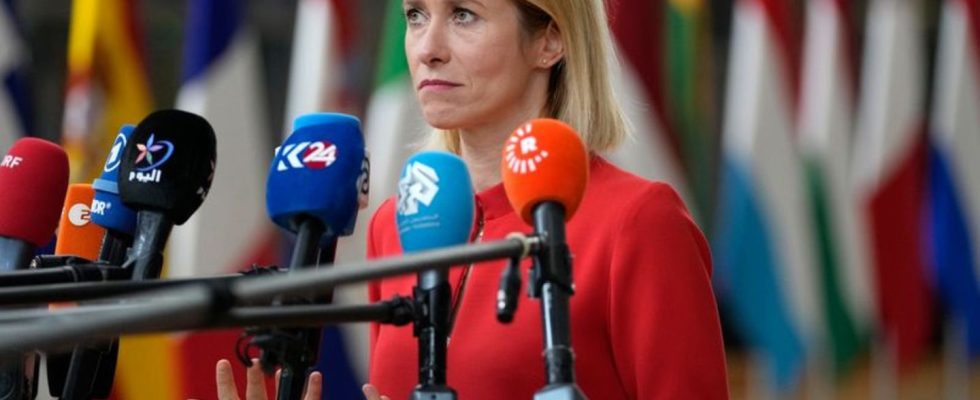Kaja Kallas
Russia puts Estonia’s head of government on a wanted list
Estonia’s Prime Minister Kaja Kallas is on the Russian Interior Ministry’s wanted list. photo
© Virginia Mayo/AP/dpa
Estonia’s Prime Minister Kaja Kallas is a sharp critic of Russia’s war of aggression. Now Moscow is putting them on a wanted list and is threatening further consequences.
Russia has Estonia’s head of government According to official information, Kaja Kallas and other high-ranking Baltic politicians are wanted. “These are the people who took hostile actions against the historical memory and our country,” Kremlin spokesman Dmitry Peskov explained the move, according to the Interfax news agency.
Kallas described her inclusion on the Russian wanted list as “not surprising.” “This is further proof that I am doing the right thing – the #EU’s strong support for #Ukraine is a success and hurts Russia,” she wrote on the social network X (formerly Twitter).
In addition to Kallas, the Estonian State Secretary Taimar Peterkop and Lithuania’s Culture Minister Simonas Kairys are also on the wanted list of the Russian Interior Ministry, according to the media. Since none of them are planning a trip to Russia in view of Russia’s war of aggression against Ukraine, the step is likely to be primarily symbolic.
Lithuania’s Foreign Minister Gabrielius Landsbergis sees being placed on the wanted list as an honor. “The political assessment is, of course, that it is a kind of award for people who support Ukraine and support the fight of good against evil,” said Landsbergis in Vilnius, according to the BNS agency.
Demolition of Soviet war memorials
The Russian authorities accuse the Balts of demolishing Soviet war memorials. “We have to answer for crimes against the memory of the liberators of the world from Nazism and fascism. And that’s just the beginning,” wrote ministry spokeswoman Maria Zakharova on Telegram. Sakharova explicitly referred her statements to Kallas and Peterkop.
In the summer of 2022, a few months after the start of the Russian war of aggression against Ukraine, Estonia demolished a Soviet war memorial – a replica of a T-34 tank with a red star – in Narva on the border with Russia. There were isolated protests in the city against this. “We will not give Russia the opportunity to use the past to disrupt the peace in Estonia,” said Kallas, citing, among other things, the Russian invasion of Ukraine.
In 2007, the relocation of a bronze statue, another Soviet war memorial, from a park in Tallinn to the city’s outskirts sparked days of protests. One person was killed in the riots and more than 1,000 people were arrested. Russian-speaking Estonians said removing the monument would erase their history.
Lithuanian minister undeterred
In Lithuania, too, some Soviet-era monuments were dismantled after the Russian invasion of Ukraine. “I am glad that my work to remove the ruins of Sovietization has not gone unnoticed,” Kairys commented on his inclusion on the Russian list, which he only became aware of through the media, and added: “Seriously: the regime is doing what it always does has done: it seeks to suppress every hint of freedom, to fight against democracy, against human rights and freedoms and to continue to invent its own story that does not correspond to any facts or logic.”

